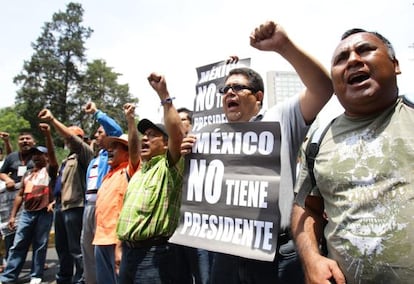Ongoing teachers' protests cause chaos in Mexico City
A series of demonstrations against reforms paralyzes various parts of the capital

For two weeks, Mexican teachers have been adding more mayhem to the already chaotic Mexico City, thanks to a series of protests over President Enrique Peña Nieto’s plans for education reform. Thousands of educators were called out by the Coordinadora Nacional de Trabajadores de la Educación (CNTE), one of the country’s powerful teacher unions (the other one, SNTE, used to be run by Elba Esther Gordillo, who is currently in prison on corruption charges). The protesters voiced their claims in emblematic parts of town such as Congress, the Senate, the vast square known as Zócalo, the airport and the headquarters of television stations TV Azteca and Televisa. There was only one major place left for them to protest: the presidential residence of Los Pinos, which they attempted to access on Wednesday.
Educators were marching to demand a halt to reforms that would force primary and middle-school teachers to submit to periodic examinations in order to keep their jobs. Between 3,000 and 11,000 people have shown up at these protests – not just teachers but also their families, including children, and union members.
The CNTE has been camping out at the Zócalo since April. The sit-in has been growing exponentially, spilling out beyond the massive square, with new arrivals from the states of Oaxaca, Michoacán and Chiapas, where at least one million children have been staying home for the last two weeks for lack of teachers. The protests are sorely testing the patience of residents of one of the world’s largest cities (nine million people in the Federal District and over 20 million in the metropolitan area). But the protests have intensified in recent days as Congress prepares to pass secondary legislation that would enable the reform to take effect.
Last week, a group of teachers prevented lawmakers from entering the lower and upper chambers of parliament on the days when they were scheduled to approve the laws. Mexican representatives decided to take the session to a convention center, but left the most controversial point out of the agenda: the norm that would create teacher evaluations. The protest ended with a confrontation between teachers and the police and building damage worth 4.5 million pesos (around 340,000 dollars).
Educators were marching to demand a halt to reforms that would force teachers to submit to examinations
Mexico spends 15 percent of its budget on education, of which nearly 93 percent goes toward teacher pay.
The demonstration managed to put the law’s approval on hold and opened negotiations with lawmakers. But an agreement is not an option for members of PAN, the conservative party that is partnering with the ruling PRI. Party representatives have stated that they will not bow to teacher pressure and have already filed a complaint against the CNTE before the Attorney General because of the damage caused by last week’s protests.
Unfazed, after shutting down Congress and the Senate, the demonstrators moved on to Mexico’s international airport, blocking access roads and creating chaos for seven hours.
Every demonstration means hundreds of streets being closed off to traffic. On Tuesday, teachers took their claims to the headquarters of TV Azteca and Televisa, blocking traffic on the southern portion of the Anillo Periférico beltway, one of the city’s busiest thoroughfares. Hundreds of citizens complained and demanded that authorities step in. On Wednesday, as a new column of protesters marched down the broad avenue Paseo de la Reforma, at least six subway stops were forced shut.
Last week, a group of teachers prevented lawmakers from entering the lower and upper chambers of parliament
Faced with petitions to stop or at least control all the demonstrations and blockages by the teachers, Mexico City Mayor Miguel Ángel Mancera stated that his administration lacks enough police officers to hold back the thousands of demonstrators who protest almost on a daily basis, and that the city’s goal is to “safeguard the integrity of those who live in the capital.” In May, a local government official, Héctor Serrano, told this newspaper that teachers were free to occupy public squares. “We at the government of the Federal District are not repressive. The police go after crimes, it is not the kind of police that goes after demonstrators.”
Added to the teacher mobilizations is another issue that could alter the city’s routine in the coming days. Peña Nieto will issue his first government report. At first it was scheduled for Sunday, but on Wednesday the president announced a date change and the cancellation of his trip to Turkey. Protests by teachers and other sectors scheduled for Sunday had already forced authorities to make a drastic decision: there will be no Mexican Soccer League matches in the capital. The national sport will also have to wait until the teachers end their protesting, or until law enforcement officers are sufficiently numerous to protect matchgoers.
Also on Wednesday, 12 teachers were admitted into the presidential residence, although Peña Nieto was not there himself (he was in the state of Nuevo León, north of the country, to celebrate Grandfathers Day.) It was from there that he sent out a message to the members of CNTE: “In this effort we will not relent, we will not yield; we are firm and decided in our quest to make true the kind of education reforms that will ensure a quality education for all Mexicans.”
Meanwhile, legislative buildings have stepped up security ahead of future protests. The residents of Mexico City have little left to do but ask themselves where the next demonstration will be, in order to try to avoid it.
Tu suscripción se está usando en otro dispositivo
¿Quieres añadir otro usuario a tu suscripción?
Si continúas leyendo en este dispositivo, no se podrá leer en el otro.
FlechaTu suscripción se está usando en otro dispositivo y solo puedes acceder a EL PAÍS desde un dispositivo a la vez.
Si quieres compartir tu cuenta, cambia tu suscripción a la modalidad Premium, así podrás añadir otro usuario. Cada uno accederá con su propia cuenta de email, lo que os permitirá personalizar vuestra experiencia en EL PAÍS.
¿Tienes una suscripción de empresa? Accede aquí para contratar más cuentas.
En el caso de no saber quién está usando tu cuenta, te recomendamos cambiar tu contraseña aquí.
Si decides continuar compartiendo tu cuenta, este mensaje se mostrará en tu dispositivo y en el de la otra persona que está usando tu cuenta de forma indefinida, afectando a tu experiencia de lectura. Puedes consultar aquí los términos y condiciones de la suscripción digital.









































